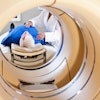MRI detected a high prevalence of abnormalities associated with knee osteoarthritis in middle-aged and elderly patients who had no evidence of the condition on x-ray, according to a study published online on Wednesday in the British Medical Journal.
Researchers from Boston University School of Medicine, Brigham and Women's Hospital in Boston, Lund University in Sweden, and Klinikum Augsburg in Germany evaluated right knee MRI scans of 710 ambulatory patients from the Framingham Osteoarthritis Study.
The review showed that approximately 90% of knees that showed no signs of osteoarthritis on x-ray exams displayed clear signs of osteoarthritis with MRI. In addition, MRI abnormalities were highly prevalent even in patients with no knee pain, suggesting that MRI is not useful in this age group to evaluate knee pain.
MRI could be detecting early osteoporosis; however, further research is needed to determine how many of the patients will later be diagnosed with knee osteoporosis, said lead study author Dr. Ali Guermazi, PhD, a professor of radiology at Boston University School of Medicine. MRI would be too expensive to perform as a routine imaging investigation, the authors noted.



















